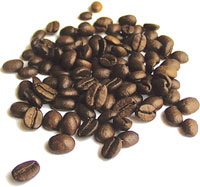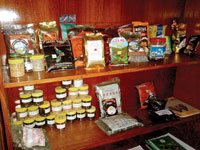Nepali tea may be making its mark in the world market, but coffee isn't far behind.  Unlike the British in Darjeeling or Ceylon Nepal never had colonial companies planting tea or coffee. Legend has it that coffee plants were introduced to Nepal only in 1938 by a certain yogi named Hari Giri who was fond of the caffeinated beverage, and brought seeds from Burma to cultivate coffee for his own use.
Unlike the British in Darjeeling or Ceylon Nepal never had colonial companies planting tea or coffee. Legend has it that coffee plants were introduced to Nepal only in 1938 by a certain yogi named Hari Giri who was fond of the caffeinated beverage, and brought seeds from Burma to cultivate coffee for his own use.
Commercial production, however, didn't start till 1976 with the import of Arabica coffee from South India. Nepali coffee is grown commercially in a scattering of over 17 districts in the midhills from 800-1,600m where the soil and climactic conditions are favourable.
Nepal is going for highland Arabica for the specialty coffee export niche market. Through private companies such as the Highland Coffee Promotion Company Ltd
(HCPCL), Everest, Plantec, Gulmi Cooperative Nepali coffee is now exporting processed green coffee beans for major coffee markets including the US, Japan and some European countries.
 Last year, HCPCL shipped 23 tons of coffee to Holland Coffee in the United States which is a major supplier to the Starbucks chain. Production is still miniscule in proportion to the demand and Nepal's total exports of coffee beans in 2005 were only 65 tons but this set to grow with new marketing efforts.
Last year, HCPCL shipped 23 tons of coffee to Holland Coffee in the United States which is a major supplier to the Starbucks chain. Production is still miniscule in proportion to the demand and Nepal's total exports of coffee beans in 2005 were only 65 tons but this set to grow with new marketing efforts.
Besides Gulmi in central Nepal, Kabhre is one of the major coffee-producing areas where Winrock International along with USAID and other partners are helping small farmers with market-led cash crops.
Chandra Bhusan Subba is team leader of the Tea & Coffee Global Development Alliance-Smallholder Mobilization through Improved Governance with its unwieldy acronym, TCGDA-SMIG.
 Subba and his colleague Ratna Bhuban Shrestha recently brought back coffee seeds from Sumatra for planting in Kabhre. Winrock also got coffee experts from El Salvador with Tekisic, Pacas and Pacamara seeds which are now available in Nepal through government-subsidised and private nurseries.
Subba and his colleague Ratna Bhuban Shrestha recently brought back coffee seeds from Sumatra for planting in Kabhre. Winrock also got coffee experts from El Salvador with Tekisic, Pacas and Pacamara seeds which are now available in Nepal through government-subsidised and private nurseries.
In contrast to monoculture tea gardens in India, coffee in Nepal is usually grown in combination with other crops, particularly under a canopy of fruit trees.
Just outside Dhulikhel Chola Nath Timilsina grows coffee on his terrace farms where he earlier raised corn. He even roasts some of his own coffee beans and sells them by the highway alongside women offering tomatoes and plump cauliflowers.
The wizened 64-year-old farmer points out his coffee bushes set amidst guava, mango, macadamia nut seedlings. "I now earn about 15,000 rupees more a year from coffee," says Timilsina who is among 12,000 household farms who have benefited from this market-based approach to cash crops.
Winrock plans to expand the program to 6,000 households in the next two years so that in a decade 700,000 farmers across Nepal will benefit from tea and coffee production. Says Winrock's Luke Colavito: "This will provide strong examples of commercial markets benefiting poor small farmers, and helping Nepal in a period of crisis."


